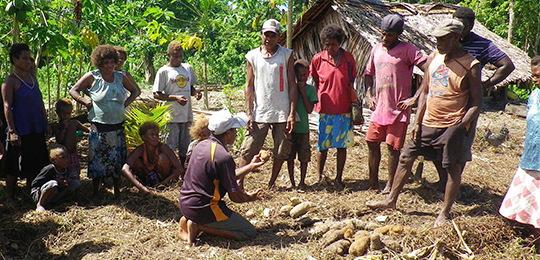April 2019
DIVERSIFYING FARMING SYSTEMS

In the Solomon Islands, Pitakia Tikai the Coordinator of Kastom Gaden Association (KGA) recently reported the Searem Niu Plant Long Gaden project (2006), identified the need to diversify the country’s crop varieties. With the support of AusAID, the project was established as a way of combating the strain of the country’s growing population (currently estimated at two percent each year) was having on people’s livelihoods.
‘Farmers and families in rural areas have faced many difficulties related to food production brought upon by natural disasters, pests, and diseases. Population growth has also put a greater strain on the availability of the land and causing harm to people’s ability to sustain themselves’.
As a result, resilient diverse farming systems were prioritized by KGA for food and livelihood security reasons. The project sought to introduce African yam, cassava, and sweet potato varieties from overseas which established a process of crop diversification and also improved the country’s self-sustainability.
‘KGA provided training in various basic farming methods and livelihood improvement initiatives, including nutrition awareness and disease management, and finance. This was done to improve food and nutrition security for those on smaller incomes’.
The impact of the programme saw a rise in the number of Solomon Islands Planting Material Network members (PMN). To date, there are now 5 000 members of this network, which was established by KGA to give people in remote areas more access to superior varieties of sweet potato and yam including greater access to technical information about how to grow foods closer to their homes.
The project did however fall behind schedule and therefore the plan for the Searem Niu plan was not fully carried out; some collections from communities across the Solomon Islands were not completed.
Pitakia Tikai says although the project ended, PMN members still continue to exchange the planting materials chosen by the project with local farmers which have also seen a rise in the self-sustainability of the farmers and PMN members. This continued sharing of superior crop varieties he says, ensures farmers have access to high-potential crops.
